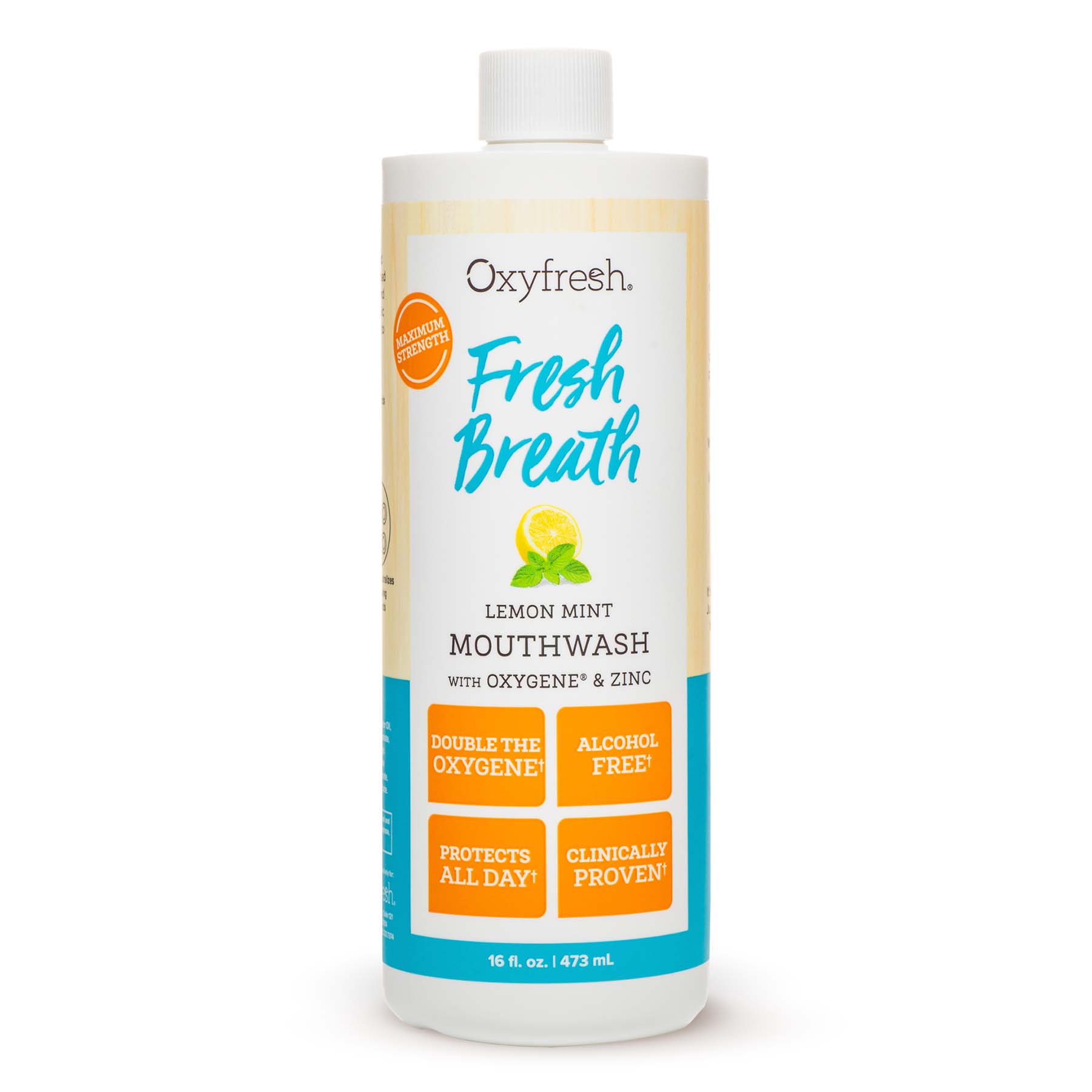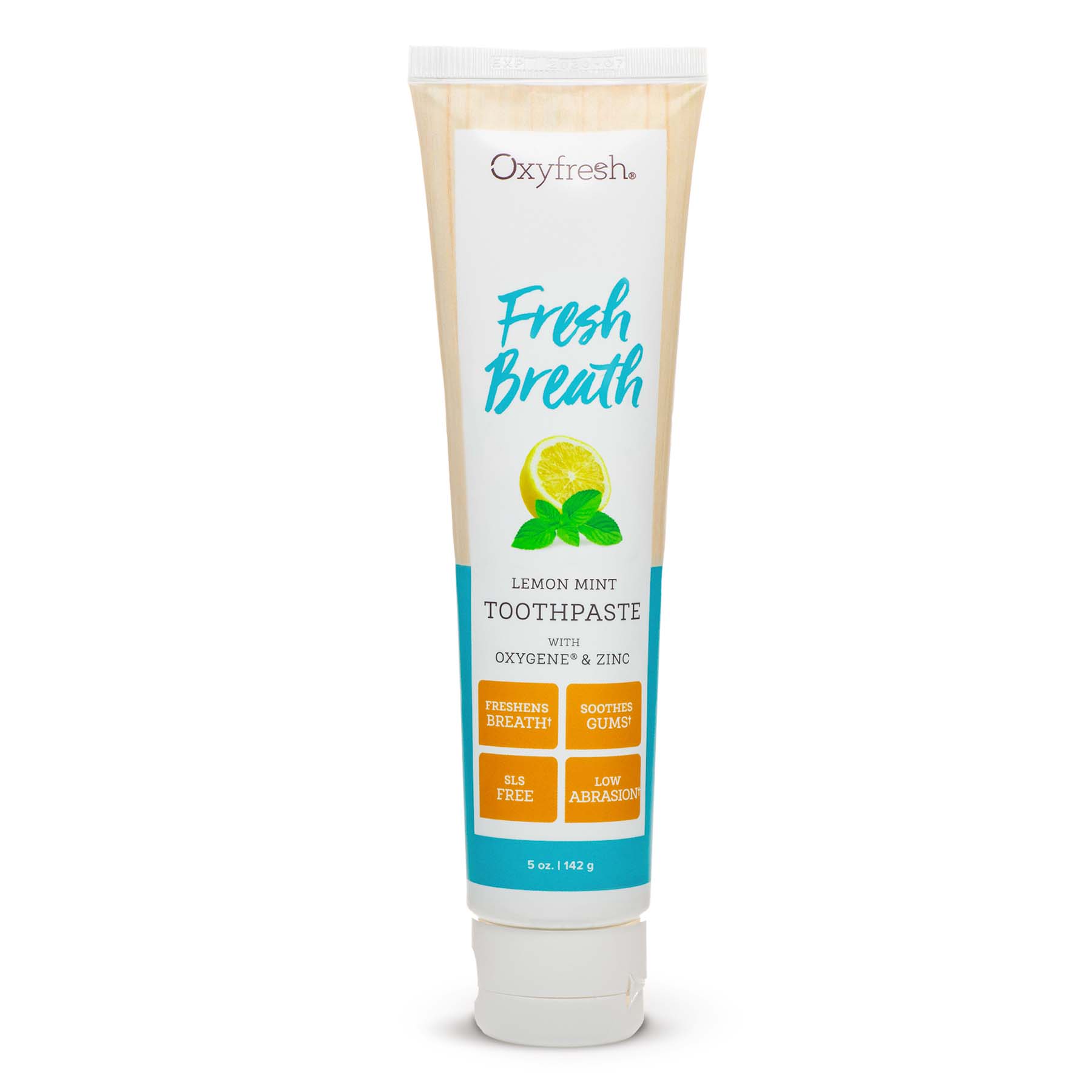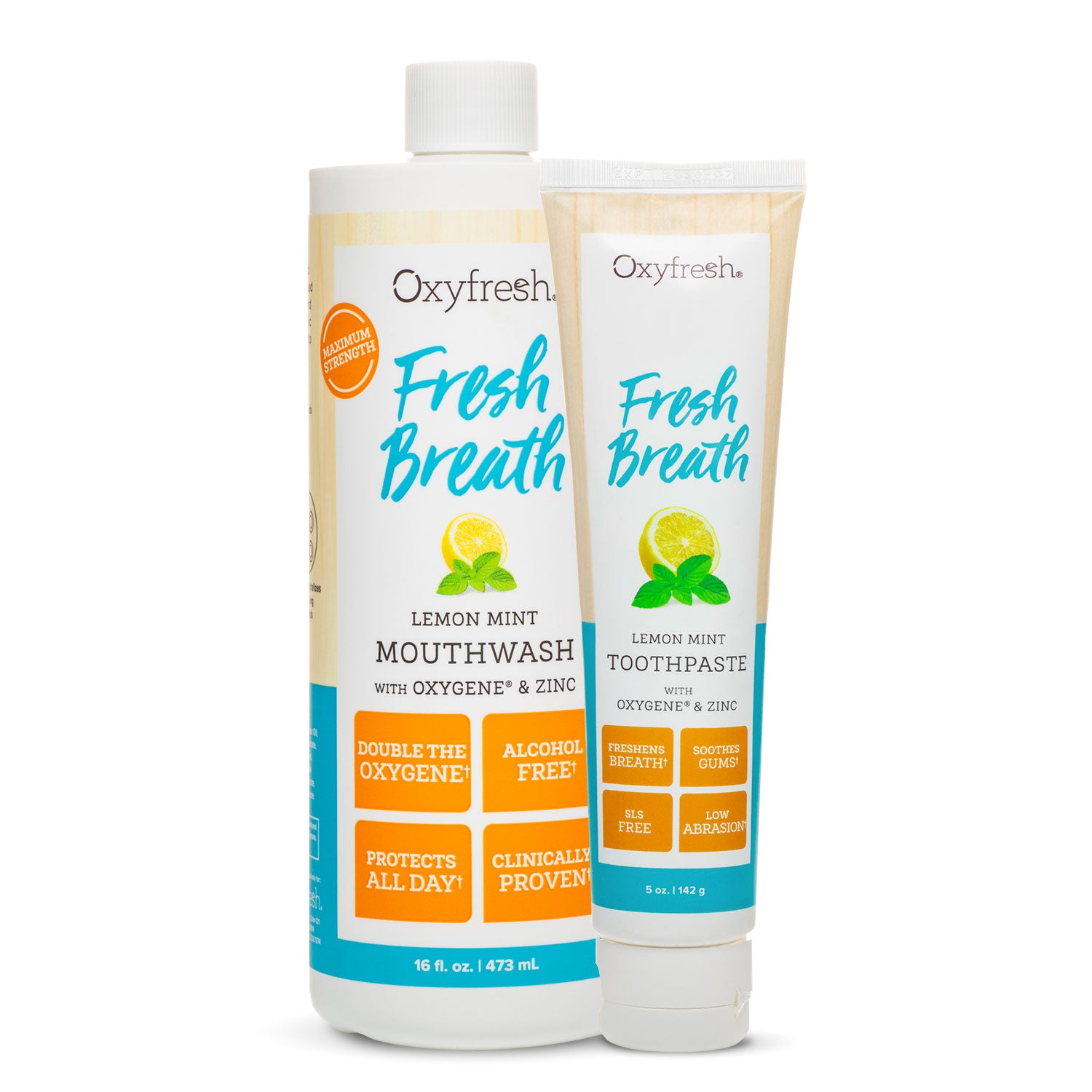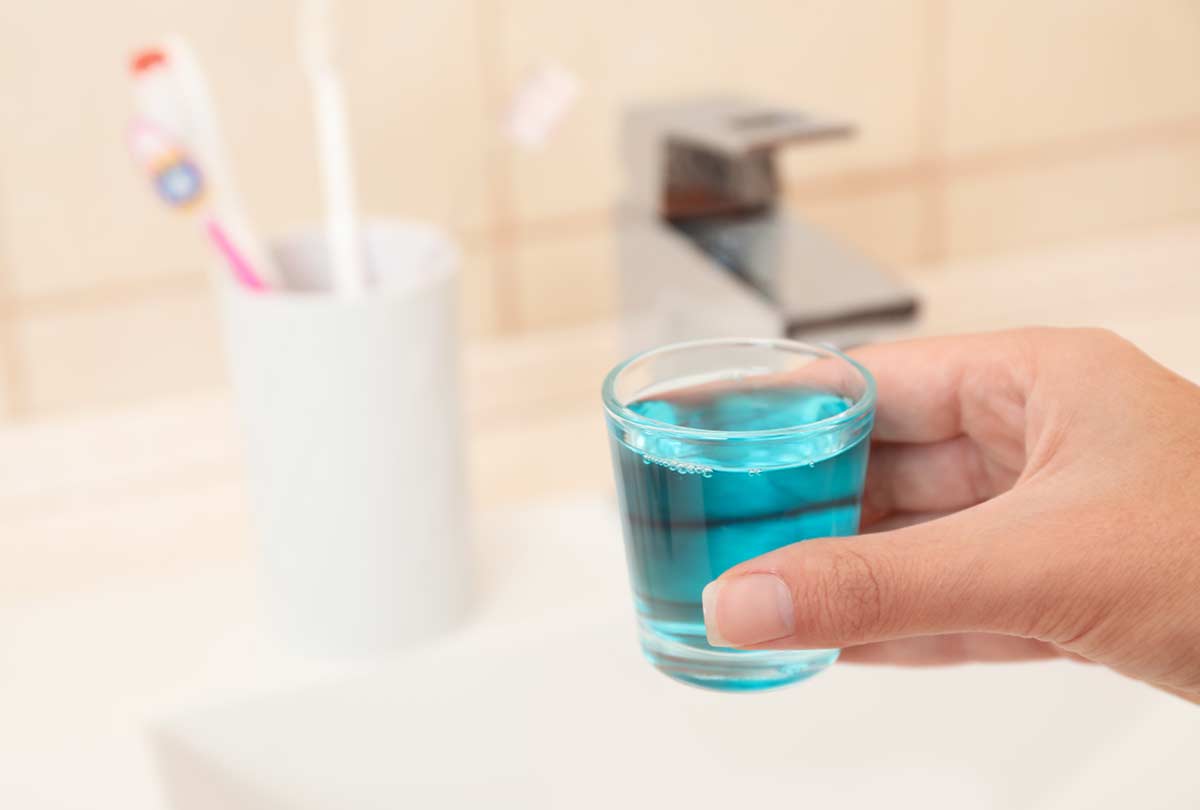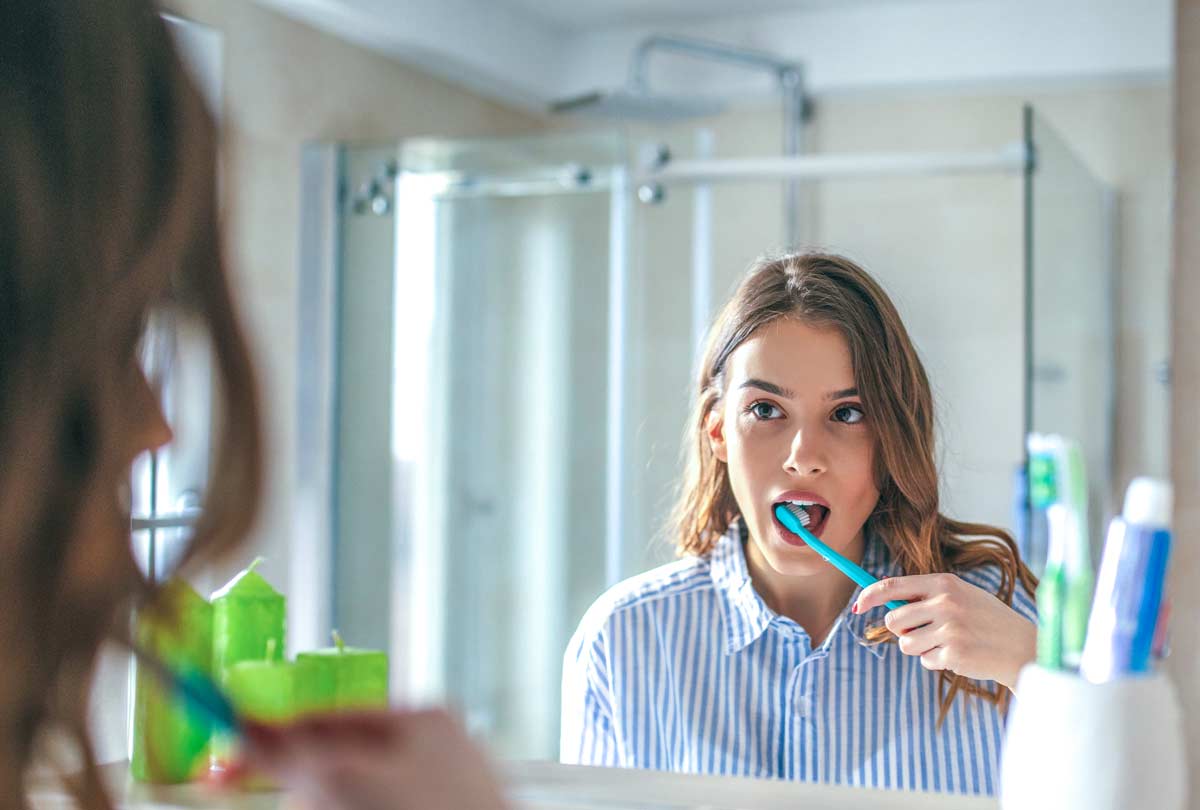Even Stubborn Garlic Breath
If you feel like your breath is really bad all the time, it can lead to awkward social encounters (Is that person really backing away from me?!), low self-confidence, and even fear of leaving the house.
But don’t worry – if you’re wondering how to cure halitosis, we’re laying out all the answers for you right here.
Why Do I Have Horrible Breath?
OK, horrible is a strong word, but we get it. If you suspect you have bad breath, it can feel like there’s a spotlight shining on your smile. And it’s definitely not fun trying to talk behind your hand or with your mouth half-closed!
But take heart – sometimes the problem isn’t as bad as you think. (And, hey, even if it is, there ARE solutions that will work for you.)
Plus, keep in mind that – much like the phrase "Everybody poops" – EVERYBODY gets halitosis from time to time ... yep, even celebrities with their blindingly white smiles. In fact, on any given day, 1 in 4 people will be battling bad breath.
Reasons for Bad Breath
- Poor Oral Hygiene: More often than not, it’s poor oral hygiene that causes halitosis – you know, not brushing and flossing enough and blowing off dental cleanings. This can lead to an abundance of smelly plaque and tartar in the mouth and give you gingivitis, aka gum inflammation. Also, if you notice an odor when flossing one tooth or more, especially your back molars, that’s an indicator of either rotting food particles, tooth decay or gum problems.
- Periodontal Disease: If your oral health doesn’t improve, gingivitis (reversible early on) will eventually morph into the more serious form of gum disease called periodontal disease. And odds are, you’ll pay the price with your breath. In a halitosis case study, 80% of subjects with gingivitis or periodontal disease had bad breath. Of note, the amount of "tongue coating" and bleeding from the gums indicated the greatest number of smelly sulfur compounds.
- Rolling in Garlic: OK, maybe not rolling per se, but if you love sulfurous foods like garlic, your breath is inevitably going to smell after you go to town on the garlic bread. How to get rid of garlic breath if you just can’t resist the pungent stuff? Right after your meal, eat an apple, drink green tea, chew on parsley, swish water with a squeeze of lemon, or use an essential oil mouthwash. All these tricks will help neutralize garlic's sulfur compounds. And if you’re a planner, eat garlic in the evening, as garlic’s sulphur compounds can get absorbed into the bloodstream for several hours.
- Morning Breath: No one’s breath smells like roses in the morning, but if you’re a mouth breather or snorer, your "morning breath" will be a lot worse than the average Joe’s. Saliva is the body’s way of flushing away stinky bacteria, so if your mouth is dry, you're bound to have bad breath. That’s why it’s smart to always have a glass of water by the bedside, run a humidifier in your bedroom, and get help for a snoring problem.
- Bad Breath from Throat: As if sinus infections, allergies, post-nasal drip and tonsil stones weren’t annoying enough as is, they can also bring on halitosis. Fortunately, once you get healthy, the bad breath should go bye-bye.
- Oral Surgery: If you have horrible breath after tooth extraction surgery, it could be from blood accumulating in your mouth overnight or from bacteria gathering around the wound. Follow your post-op directions to keep it free of infection and the smell should soon go away.
- Dry Mouth: Saliva is essential for keeping bacteria in the mouth under control. If your mouth is dry all the time and not just in the morning, that puts you as a likely candidate for chronic halitosis. Habits like smoking, drinking too much alcohol, and not drinking enough water can all cause dry mouth. Many medications, OTC or prescription, can also cause dry mouth. That’s why the question of how to cure halitosis often starts with solving a dry mouth problem.
- Health Issues: Diabetes (marked by a fruity breath smell), kidney disease ("ammonia breath"), and metabolic disorders can all cause distinctly bad breath. Cancer treatments, especially of the head and neck area, can also lead to bad breath because they dry out the mouth.
- Unhappy Gut: While most cases of bad breath come from the mouth, if you notice your breath has a "rotten egg smell," this may be a sign that your gut needs a little love. How to fix bad breath from stomach starts with eating healthy fermented foods, taking a daily probiotic, or talking with your doctor if you have GERD or acid reflux.
Can Cavities Cause Bad Breath?
Cavities can definitely give you bad breath because they’re literally areas of decay. (The word "decay" is never associated with freshness!) Bacteria like to gather in these little pockets and cause a stink. But keep in mind, just because your breath is bad does not mean you have a cavity. You’ll want to be sure, which is another compelling reason to make a dental appointment.
How to Tell If Your Breath Stinks
To self-diagnose your bad breath, there are a few tests you can do at home. Or, you can always talk to your dentist. They’ll be able to give you the most accurate picture of what’s going on with your breath.
Bad Breath Tests
5 Secrets for Amazing Breath
#1. Pay Attention to Your Tongue
When most people think of good oral health habits, they just think of brushing and flossing. And don’t get us wrong, these things are super important for fresh breath. But here’s a little-known secret: the MOST POPULAR hangout spot for halitosis compounds is the back of the tongue! Seriously, the next time you’re posing in front of the mirror, take a look. If you see a white or yellow coating on your tongue, that’s stinky bacteria and it has GOT TO GO!
Pro tip: Don’t rely on a toothbrush to clean your tongue. Tongue cleaners work 50% better! If you don’t want to invest in one (they’re less than a coffee drink, btw), use a kitchen spoon.
#2. Focus on Community
By community, we’re not talking about doing kind deeds for your neighbors (although, that would be very nice). We’re talking about your oral microbiome, which is like a little community of bacteria in the mouth. They can either play nice together or "reek" havoc. Fortunately, there are many simple ways to balance your oral microbiome.- Brush with a "good bacteria" toothpaste. You want your toothpaste to actually neutralize harmful bacteria so it can’t damage your teeth and bone tissue, making you susceptible to periodontal disease and bad breath.
- Avoid alcohol-based mouthwashes. Alcohol targets good and bad bacteria indiscriminately and contributes to dry mouth, which is all but guaranteed to give you halitosis.
- Eat probiotic-rich foods. This will benefit you two-fold, improving both your mouth AND gut bacteria.
#3. Be Conscious of Carbs
Is a rockin’ beach bod really worth the price of halitosis? We say no! (Then again, we’ve never been able to resist the come-hither stare of a baguette loaf.) For the 12.9 million Americans who try a keto (low carb) diet each year, they’re often met with the infamous "keto bad breath."
But on the flip side, too many carbs can also contribute to halitosis, as it makes the mouth more acidic and kicks up plaque production. Like mom always said [mumbles with bread in mouth]: everything in moderation.
#4. Address Any Gum Problems You Have
With the more advanced gum problem of periodontal disease, the halitosis will continue until you get a deep cleaning, where the dentist cleans out bacteria below the gum line. It’s an investment well worth it, because those with periodontal disease will still have halitosis even after brushing and flossing because these instruments can’t reach below the gum line. Once you get a deep cleaning, your breath will be instantly fresher.
#5. Stay Hydrated
Sometimes the simplest solutions are the most effective. Drinking more water is one of the best breath fresheners on the planet. Remember – saliva is the body’s natural way of keeping the breath fresh because it washes away bacteria and leftover food particles. Drinking more water throughout the day and at meals will help with your saliva flow and overall oral health. If you're concerned about any medications you're on that are causing dry mouth, be sure to discuss this with your doctor.
Got Halitosis? Avoid Alcohol-Based Mouthwashes at All Costs.
How to get rid of garlic breath, morning breath, and just "regular bad breath" can be elusive to many people because of the dental products they use at home.
Typical alcohol-based mouthwashes don’t actually help with halitosis, besides temporarily masking it with a strong menthol scent. They actually make bad breath worse. Because of their high alcohol content, they dry out the mouth. And if you’ve been following along, then you know ... a dry mouth is no good if you’re looking for how to cure halitosis.
Best Mouthwash for Bad Breath
Did you know that 90% of halitosis sufferers spend around $400 a year trying to fix their bad breath? Rather than stockpile spearmint gum or waste money on boozy store-brand mouthwashes, make the switch to Oxyfresh.
Our most popular Fresh Breath Lemon Mint Mouthwash is an alcohol-free, max-strength mouthwash with 2x the Oxygene® and zinc to give you amazing breath that lasts all day.
What is Oxygene®? Our proprietary blend of chlorine dioxide. (Don’t let the word "chlorine" scare you ... it’s not the stuff that’s dumped into pools!) Chlorine dioxide is safe, non-toxic and has been used for decades as a public water purifier, as it neutralizes harmful bacteria.
For smiles, it works the same way! Oxygene® instantly oxidizes the bacteria that lead to halitosis, plaque, and unhealthy gums, purifying your smile and breath like no other brand can. Plus, unlike alcohol mouthwashes, Oxyfresh won’t dry out the mouth, cause tissue sloughing, or upset the balance of your oral microbiome.
Combined with a crisp and refreshing blend of six essential oils, it’s a must-have swish in the morning, after eating garlic, before bedtime, and any time you need a fresh breath pick-me-up.
Oxyfresh Delivers Proven Results for Halitosis
In a clinical, double-blind study (NOT sponsored by Oxyfresh), alcohol-free Lemon Mint Mouthwash – along with its cool sidekick Lemon Mint Toothpaste – went up against a leading store brand.
In the study, 50 patients with periodontal disease were split into two groups. One group used Oxyfresh Lemon Mint products for 12 months, the other group used the store brand products post-deep clean.
The Results:
Oxyfresh Lemon Mint Mouthwash & Toothpaste
- 76% improvement in gum health
- 79% plaque reduction
- 44% reduction in harmful bacteria
Store Brand Mouthwash & Toothpaste
- 70% improvement in gum health
- 71% plaque reduction
- 34% reduction in harmful bacteria
As you can see, not only did Oxyfresh yield better results for oral health, but had markedly better results for reducing harmful (and stinky!) bacteria in the mouth: 44% vs. 34%.
The takeaway: The dental products you use to fight halitosis really do matter. So try Oxyfresh Lemon Mint products today. If you don’t love your new breath, you can have your old breath back!




